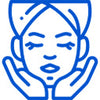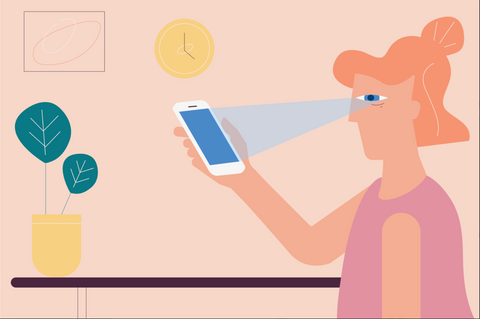Feeling blue? Maybe it’s your eyes.
Lockdown has been hard for all of us, especially our eyes - as we’re spending more and more time in front of screens.
You’ve probably heard the term ‘blue light filter’ mentioned in the media, such as Unilever’s recent report - but what actually is it? And why should you care?
Lucky for you, we’re here to answer all of your top blue light related queries. We’ve condensed this down to your top 21 questions. Which sounds like a lot of, but don’t worry, we’ve broken it down into bite-size chunks. Ready? Here we go…

1. What is blue light?
Blue light naturally comes from the sun. However, this harmful light is also produced by digital devices such as phones and TVs - and even comes from unsuspecting sources, like lightbulbs.

2. Why is blue light bad?
Not only does it leave you with headaches, dry eyes and feeling tired - but it also can affect your melatonin production and in turn your sleep. On top of this, it may also have longer term effects on your eyes (Macular Degeneration).

3. What is a blue light filter?
Blue light filters help reduce strain on the eyes and also ensure our sleep cycles run smoothly. They come in various different forms including software programmes and physical blue light filters - like screen protectors and protective eyewear.

4. What are blue light glasses?
Blue light blocking glasses have filters in their lenses that absorb blue light, and in some cases UV light, and stop them from getting through. This means that you can use screens, even at night, without the nasty side effects.

5. How do you turn off blue light on a mac?
To turn off blue light on a mac, you can turn night mode on in system preferences. This creates an orange tint that clouds blue light and its effects. You can also prevent blue light from hitting your eyes from a mac with an Ocushield blue light screen protector for MacBooks or monitors - without affecting the screen image. Not one bit!

6. How does blue light affect sleep?
Blue light impacts your sleep and wake cycle- also known as your circadian rhythm. More so than any other colour, blue light disrupts your body's ability to prepare for sleep, as it blocks a hormone called melatonin that makes you sleepy.

7. How does blue light affect your eyes?
Blue light from screens can cause digital eye strain, which leaves your eyes feeling dry and tired. Over time, blue light can also damage your retina which leads to age-related vision problems, like macular degeneration.

8. What are simple ways to limit blue light exposure?
There are a number of things you can do to limit exposure from blue light. This includes filtering blue light with glasses, screen protectors or software. You can also use low blue light bulbs and reduce time and brightness on a screen.

9. How can you protect your eyes from blue light?
Aside from using the methods listed above, there are some other ways to protect your eyes from blue light. When your eyes spend a lot of time looking at a screen, it puts a lot of pressure on the visual system and can lead to visual stress and in turn eye strain, headaches and more. Follow the 20-20-20 rule to reset your visual system. Every 20 minutes, take a 20-second break and focus your eyes on something at least 20 feet away.

10. How can you tell if your glasses have blue light protection?
An easy way to test your glasses is to pop them on and see what colour the light is reflecting off the lenses. If it's blue light that's reflecting off them then you know they are filtering some blue light as it’s reflected/not able to get through. There are some more in-depth tests you can carry out to check too - take a look at our blog for all you need to know.

11. Which has a higher frequency, red light or blue light?
Out of the two, blue light is the clear winner - as it has shorter waves. Why does this matter? Shorter waves vibrate at higher frequencies and have higher energies. Red light has a small frequency of around 430 nanometers while blue's frequency is closer to 750 terahertz. Short-wavelength light causes photochemical damage to cells and their DNA. So, every time you are exposed to blue light your cells/tissues are at risk of being damaged.

12. What is the wavelength of blue light?
Light between 380-500 nm is the blue part of the spectrum. It includes violet, indigo, blue and aquamarine. Not all blue light is bad, wavelengths of 455-500 nm that come from the sun are thought to be helpful blue that regulates our sleep cycle. Whereas 380-455 nm is known as high energy visible (HEV) light, is harmful blue and can cause damage to your eyes.

13. How can you turn off blue light on your iPhone?
Similarly to the Macbook, which we talked about earlier, iPhones also have night mode built into them which is created to help protect eyes from blue light. Night mode turns your screen an orange colour to cloud blue light. However, this can affect the pigment/colour of video or images. So if you want to keep your phone’s colour clear whilst protecting your eyes from blue light, try an Ocushield screen protector.

14. Is blue light bad for kids?
While blue light can have a significant impact on adult eyes, children are even more susceptible to the effects of blue light from digital devices. This is due to something called a crystalline lens, which is used to focus on objects. Children aren't born with natural protection and this develops over time. Up until the early teens, children have no protection at all. We wrote a recent article on this, check it out for more information.

15. What does blue light do to skin?
Long-term exposure to blue light can damage your skin - including changes to colour, inflammation and texture. This is because blue light changes the chemicals in our skin, which causes premature ageing, known as photogenic-ageing.

16. Will blocking blue light make me sleepy?
Whilst blocking blue light will help to get your melatonin production and sleeping pattern back to normal, it isn’t a one size fits all cure. It also depends on a number of lifestyle factors and time of day. So don’t worry - if you get an Ocushield filter for your Macbook, you won’t suddenly fall asleep at your desk.

17. Why is a physical filter better than a software solution for reducing blue light?
Software solutions such as night mode won’t reduce blue light emitted from screens or absorb it. Instead, it will turn you screen an orange colour in an attempt to cloud the blue light. Our filters absorb the harmful blue light, whilst keeping screen colours clear. We also find that why you need to remember to turn night mode on and off, Ocushield filters are always there, protecting you day and night.

18. What's better a blue light filter or glasses?
Both are a good option and it depends on the individual. While filters are a good solution to put onto devices, you may need one for each device. Glasses can be used across all devices, but they’re not permanent and there is a risk of forgetting to pop them in your bag. Also, if you haven't worn glasses before, after a few hours they can be a pain to keep on. One thing is clear, that whatever works best for you, it’s important to protect those peepers!

19. Do blue light glasses have an impact on prescriptions?
Blue light glasses do not impact your prescription and focus on the colours that enter the lens, instead of magnification. With more awareness around blue light, opticians are beginning to offer blue light protection for many prescription glasses.

20. What are the sources of blue light?
There are many unsuspecting sources of blue light. The sun is the biggest source of blue light, but it can also be found in LED lighting around our homes and offices as well as digital devices such as smartphones, tablets & monitors.

21. Can blue light cause cancer?
Numerous studies have found that exposure to blue light may contribute to the development of cancer and disease. This is because exposure to blue light disrupts the circadian rhythm and our body’s natural ability to fall asleep. Why does this matter? There is now new research that shows a causal link between insufficient sleep and the risk of cancer.
With blue light gaining attention in the media, and more studies highlighting the damaging effects, it’s more important to protect your eyes than ever before. We hope these simple tips and solutions help you and your loved ones to understand the impact that screens and digital devices have on your eyesight and overall health - and find ways to filter out this harmful blue light.
We hope we’ve answered any questions you may have on blue light, but if you still want to know more, drop us an email.
How we reviewed this article:
Ocushield has strict sourcing guidelines and relies on peer-reviewed studies, academic research institutions, and medical associations.
Our experts continually monitor the health and wellness space, and we update our articles when new information becomes available.


Leave a comment